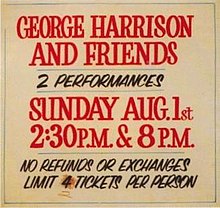Art has always been considered a limitless discipline. An expression of forms which is not regulated to textbooks and lectures, but to the virtue of people and their imaginations. Music, as an art form, has always had a universal impact. While serving entertainment remains the primary and foremost objective of an art form as rich as music, communication of thoughts and emotions across the globe with absolutely no friction of language, ethnic and cultural barriers, adds to the glory. With different versions of ‘Bella Ciao’ being equated to a revolutionary anthem for protests and rebellions to Pink Floyd’s Roger Water reciting the translated version of popular poetry “Sab Yaad Rakha Jayega” by Amir Aziz, further concretizes the fact that music is not handicapped by language and certainly not limited to a particular territory. The same was also reflected in one of the most electrifying and first-of-its-kind global charity concerts held in 1971– “The Concert for Bangladesh.

The situation in Bangladesh in 1970-71
Bangladesh was in a state of terrible chaos during 1970-71. The sorry state of political affairs, atrocities inflicted by the Pakistani Army upon Bangladesh in the quest for their territory, the lasting horrors of Cyclone Bhola in 1970 along with the plight of the traumatized and frightened citizens of Bangladesh on the verge of getting branded as refugees, were reduced to one-liners and mere 15 seconds news-sliders reports in the West which motivated the artists to organize such a concert. With precious little knowledge of Americans about happenings in South-Asian countries, the “The Concert for Bangladesh” organized by celebrated artist George Harrison, manoeuvred and translated the agony of Bangladesh in its music, for the fellow Americans to understand the seriousness of the situation, whilst enjoying distinct performances by distinguished artists. The concert was also graced by esteemed Indian artists as well. The great veteran Sitar player, Pandit Ravi Shankar who also was a close friend of George Harrison, had a significant sway of ideas on the whole organization of the concert. Being an artist of Bengali origin, Panditji had a very sound knowledge of the humanitarian crisis in Bangladesh and therefore communicated his strong-willed intention to George Harrison, who readily accepted to do something in his field of work, which eventually ended up being an organic fund-raiser concert.
Public Diplomacy and Indian Influence
The conventional diplomatic activity was in full swing during the Cold War and was largely practised by both Russians and Americans to further their purpose of attaining world supremacy. The struggles and agonies of the liberation war of East Pakistan in 1971 were a small facet of the multi-lateral war of powers around the globe. The world was heavily influenced by the Indian stance on the issue. With Indira Gandhi rampantly exercising public diplomacy to garner and mobilize international support by touring across various capitals of the world including Great Britain, East and West Germany, France, Russia, and Poland highlighting the plight of almost 10 million refugees which took shelter during the course of 1971, to openly referring East Pakistan as Bangladesh, the efforts yielded positive results as the countries concurred to stay neutral on the whole issue. This strategic statesmanship by the Indian Prime Minister along with diplomats resulted in a resolution of the crisis. As a result, India led the freedom struggle from the front and also provided financial materialistic assistance and physical training to the Bangladeshi Mukti Bahini. Along with public diplomacy, military dominance was also exercised by India. Indian Army proved its military mettle when it captured nearly one-third of West Pakistan’s army which eventually led them to surrender to India’s military prowess and liberated East Pakistan which led to the formation of Bangladesh.
Role of the Concert
The concert in its noble virtue of humanitarianism and love brought the finest minds of Music together. While the plight of Bangladesh of 1971 was already discussed at the behest of higher sovereign authorities of the state, the concert served the purpose of engaging and enlightening the general people about the humanitarian crisis. With celebrated and famed artists such as Bob Dylan, former Beatle member Ringo Starr, Eric Clapton all originating at the Madison Square Garden in New York and transcending the message of friendship, brotherhood and humanity across national boundaries, the concert was widely well-received. The concert even showcased pictures and videos of the unrest in Bangladesh in the middle of a short interlude of performances, keeping the audiences hooked to the cause. The charity concert was organized for a period of over 6 weeks of which the weekend alone raised $240,000 and millions came afterwards. The whole amount was dispersed to UNICEF for better allocation and distribution of funds to misery-struck Bangladesh. “The Concert for Bangladesh” was the beginning of many such charity concerts organized thereafter. Live Aid Concert 1985 organized by Bob Geldof and Midge Ure was one such example, which was organized for famine-struck people in Ethiopia. George Harrison, the main anchor of the concert, continues to support refugee causes around the world through his George Harrison Fund and is currently helping Rohingya children to get them access to food, water and shelter in Bangladesh.
About the author: Hamza Jamal is presently reading law and writes for The Wonk on polity and world affairs.

